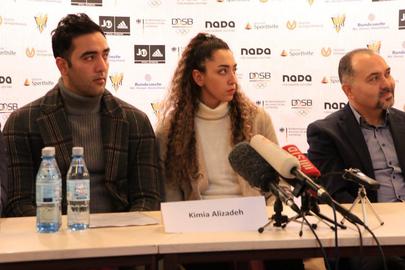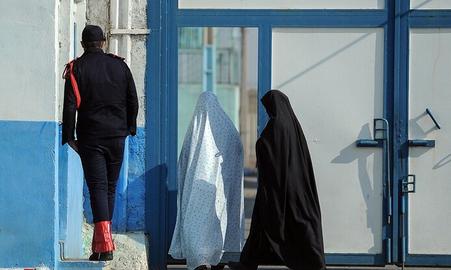Kimia Alizadeh, an Iranian tae kwon do martial artist and Iran’s first female Olympic medal winner, today explained her decision to seek political asylum in Germany and to compete for Germany in future Olympic Games. Speaking at a press conference in Germany, wearing a polo shirt and no headscarf, said that she had taken the radical step to leave her homeland for a “peaceful” life and to continue competing as a martial artist at the Olympic level.
But why did she choose to leave Iran?
On 21 August 2019, Ayatollah Ali Khamenei, Iran’s Supreme Leader, posted an image of "Kimia Alizadeh" on his Twitter page and wrote in English: "I wholeheartedly thank all [Iranian] women athletes who appear on the international scene with a veil."
Shortly after, when the Iranian Olympic team returned to Tehran after engagements abroad, Khamenei again wrote: "To [Iranian] women athletes who took the honorable step of wearing the veil before others, and [particularly] to the brave lady who wore a full veil, I welcome home the pioneers of the nation’s sports, and coaches; I thank you all. We appreciate you."
Two keywords were embedded in these posts; "Islamic hijab,” repeated in both messages, and "We appreciate you.”
Khamenei even mentioned Alizadeh’s name. Alizadeh is prominent in Iran for her 2016 Olympic medal win – and at that time she appeared on the champions’ dais wearing her headscarf. Khamenei’s second message referred to Alizadeh and he said that he “appreciated” her wearing the veil that all Iranian women athletes are required to wear.
How did Alizadeh express her own gratitude in return? By travelling to Holland and then requesting political asylum in Germany. Reuters has reported that her decision to request asylum in Germany was to avoid living with the “enforced” veil or other forms of Iranian government coercion.
Alizadeh, who first travelled to Holland two months ago to start a new athletic career in Eindhoven with the Dutch national team, has decided to move on to Germany for her asylum claim and to compete ultimately for that country in future Olympic Games.
Speaking at the press conference, hosted by the the German Taekwondo Federation, Alizadeh who appeared with her husband Hamed Madanchi (himself a former member of Iran’s national volleyball team, and now also an asylum seeker) explained that she had “come to Germany for a peaceful life and to achieve my goals.”
A German tae kwon do official added that Germany has for decades welcomed athletes from abroad into its national teams.
Alizadeh – who previously competed while wearing a hijab, the Islamic headscarf, and was admired by Iran’s leader – now described her decision to leave Iran with her hair free and in plain sight.
"Today, since I am now married, the most important thing for me is to have a quiet life. I'm looking for a quiet life, other than winning Olympic medals and world championships and the achievement of [other] goals that I have in mind."
Kimia Alizadeh's reference to a "quiet life" after getting married is not doubt true – though her timing in claiming asylum may also be motivated by completing the asylum process in time to compete in Tokyo at this summer’s Olympic Games. Her chances may be slim. But Alizadeh is only 21 years old; in four years, at the Games following Tokyo, she will presumably be at the height of her career and competing under the German flag.
visit the accountability section
In this section of Iran Wire, you can contact the officials and launch your campaign for various problems

























comments